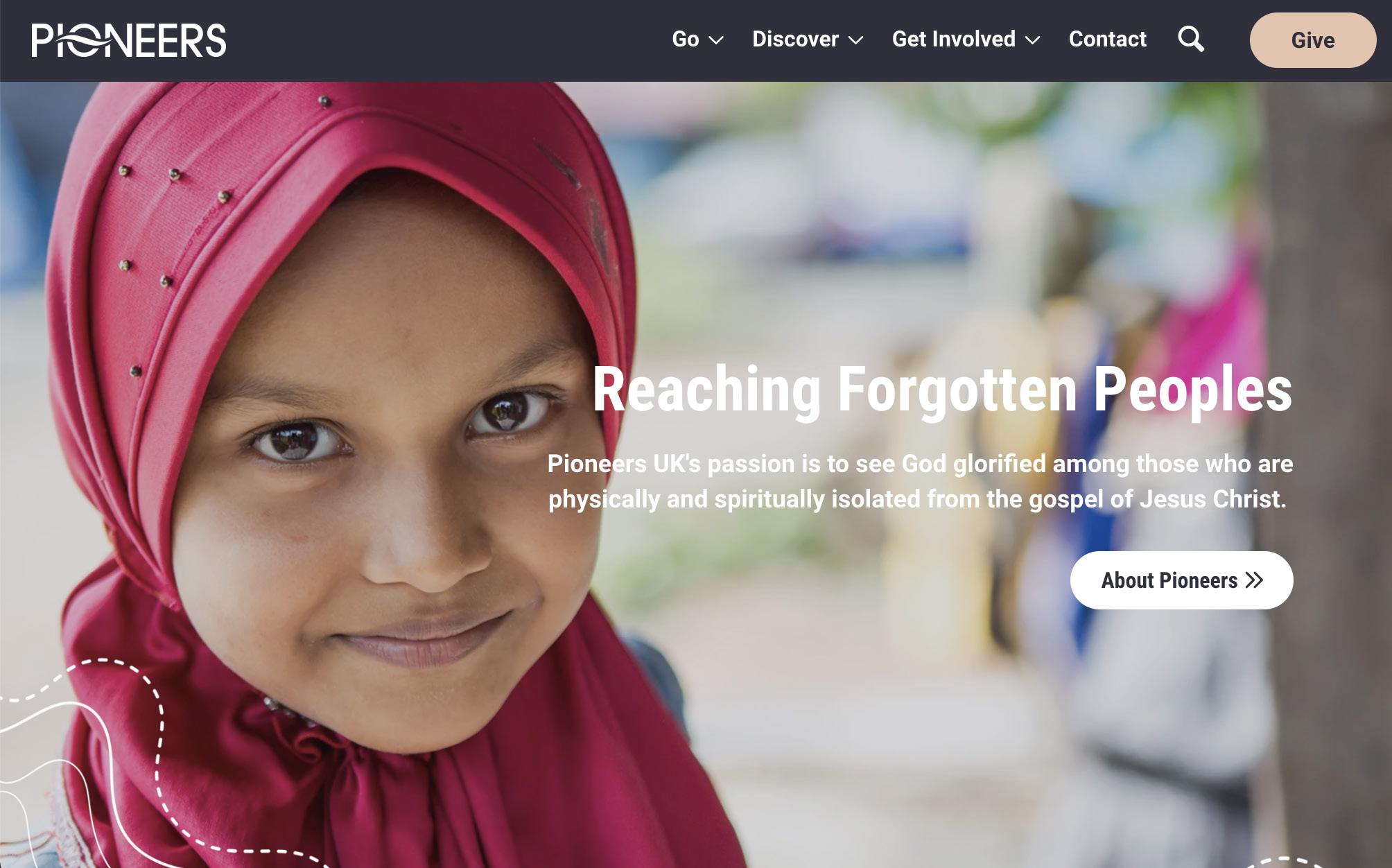





It may surprise you to hear that God doesn’t call superheroes to the mission field. Having served as a missionary myself, I’m very well acquainted with the fact that missionaries are regular people whom God calls and equips as they obediently follow that call day by day, not people who are super-godly or who have it all together already. Some may start out a bit more stable or more godly than others, but even the legends of our Mission and others had their rough days, uncertainties, fears and failures.
Mental health has been a topic of much discussion in recent years. Our growing understanding of depression, PTSD and other mental illnesses has led to increasingly robust treatments in the healthcare sector. But how does our recent increased attention to mental health affect how we send people to the mission field? For Pioneers, thankfully, not much! We have striven for many years to ensure that our field members are well cared for through all phases of their ministry. From making sure they’re mentally and physically well enough to go in the first place, to supporting them as a matter of first priority while they’re in active service, we work hard to take care of our members - mentally, emotionally and spiritually.
This edition of Reach is all about member care: the art of supporting our missionaries so that they can get on with the work the Lord has called them to. You’ll hear from several of our member care team and discover the variety of ways we look after our folks on the field. And be sure to check out page 19 to find out a major way you can get involved with caring for our members.


Happy reading!
well in the midst of the challenging context of much of crosscultural ministry. Part of that preparation happens through the wellbeing assessment process. “Wellbeing” is a broad term that encompasses growing toward a balanced maturity in physical, mental, emotional, relational and spiritual health. As I walk with an appointee through the wellbeing process, I’m looking to assess and give feedback on areas such as spiritual maturity, emotional resources, mental health challenges, interpersonal skills and cross-cultural sensitivity, among others. It’s also an opportunity for the appointee to gain more insight into how they cope with stress, feed themselves spiritually, interact with a team, and understand their own vulnerabilities. Lastly, we combine the assessment and insight to develop recommendations that feed into a practical plan for pastoral care while on the field.
BY PATTY, PIONEERS’ WELLBEING ASSESSMENT OFFICER
In any working environment, the wellbeing of workers is important. But in the case of those ministering cross-culturally, it’s critical. The stakes are high. Individuals and families are preparing to leave behind their familiar support structure and start from scratch learning to function in a new culture while adapting to a rapidly changing, multicultural team. Throw in some family challenges at home, relational friction with colleagues, loneliness, intense spiritual warfare, and it can add up to a highly stressful environment. At its worst, the fallout from missionary burnout or moral failure can have far-reaching impacts on families, co-workers, local believers and unbelievers, as well as the sending church and supporters.
Does this mean we can only send perfect people? Clearly not! But it does highlight a need to prepare people to cope
In Pioneers UK, we use a life questionnaire, personality testing, and an interview format for the assessment process. The questionnaire asks about family history, formative experiences, current relationships, healthy and unhealthy ways of handling anxiety, how individual strengths and weaknesses play out in team context, accountability, and much more. The wellbeing interview builds on the questionnaire answers and allows time to explore certain areas in more depth. Recommendations from the wellbeing assessment process might include reading a book, pursuing counselling for a particular issue, or asking a friend or pastor to meet regularly online for support and accountability.
So, if we’re not looking for perfect people, what kind of people are we looking for? Those with a faith tried and tested by the realities of living in a broken world, a vibrant faith that authentically points to Jesus. Those who are growing in giving and receiving forgiveness of others. Those walking into the challenges ahead with their eyes open, knowing themselves and knowing the Lord, and who are learning to turn quickly to Him. I love playing a small role in helping our appointees prepare well for faithful, wholehearted, sustainable service as wise stewards of all aspects of their wellbeing for God’s glory. ~

Hi Graeme! Thank you so much for taking a minute to share with our readers about member care. Let’s start with an easy one! What’s a working definition of member care to you?
Member care is, in some ways, all things to all people. People have different interpretations. Cultures have different interpretations. Within Pioneers’ multicultural teams you’ve got member care on each team, and everybody’s understanding it differently, which is quite interesting. To me, being a practical guy from a practical background, member care is exactly what it says on the tin - that we are looking after our missionaries or ‘members’. How that then works out can be different, even from base to base. But what we’ve developed at Pioneers UK is, I guess, a mix of practical and emotional. And it’s not a ‘one size fits all’, because different people have different expectations and different needs. So what it means to me is what it says on the tin, but when you open the tin... well, that could be a bit of a surprise!
G: Yeah, the hope would be that we’re more proactive, because we’re pre-empting the reactive. We try to know our members so well that, in theory, nothing comes as a surprise. That’s not always the case, but the hope is that we know our members relationally so that we’re intercepting issues before they actually happen. Stuff will still happen - for example,
a car accident that takes us all by surprise - and then we’ve obviously got to be reactive. Or something can happen and we discover we haven’t known our member well at all, and they surprise us with something out of the box so that we have to be reactive. But as a generality we like to have that relationship so that we’re proactively intercepting and dealing with any issues before they come up.
What are the areas of member care that we have chosen to focus on and how does that compare to the areas of member care that other agencies or groups have chosen to focus on? Is there a disparity?
There are lots of differences in member care. I was leading a session on member care for a Pioneers group that had a mix of Africans and Americans. When I asked the Americans, “What is member care?” Their answer was very much about emotional welfare. The Africans responded that it was about practical hospitality and community and relationships. I think in the UK, we’re somewhere in the middle. It’s both practical and emotional welfare.

In answer to the first part of your question, I really do believe that God has given us a team that have incredible giftings and most of the team are voluntary, or non-stipendary. Most have had previous experience on the field in some context and have volunteered themselves to us... and we really see that that has been God’s doing. Our member care is not a one person show. It’s very much different giftings, different specialities or distinctives that make up a member care team, whether that’s prayer, emotional welfare, doing assessments, practical stuff, security, or children’s care. It’s not all-inclusive; there are still going to be gaps. But our hope is that we are supporting people on the field so that they can let go of the stuff that would hold them back and get on with their ministry.
care people of quite a few different cultures. Does knowing that the recipients of your member care are from different cultures affect the approach that you take?
Certainly different cultures have different ways of doing things. And that’s exciting. That’s one of the interesting parts of the job. And that does come out in expectations, whether it’s the financial side of things, or the ministry side of things and how that’s done, or the timekeeping side. Equally, there are differences in what folks expect from member care: where they go for member care might be back to their home church in Hong Kong, as a first line of call, rather than to the sending base. We want very much to work with sending and local churches as being the first line rather than coming straight to the member care department. But it’s part of the fun of it, that it’s not all a straight line saying, ‘Go this way for member care’.
You mentioned earlier that member care means different things in different cultures, and we as a sending base have under our
You’ve been saying to all of us in the office for many years now, “We are all member care.” Can you explain what that means?
Our Christian way of doing things should be markedly different from the rest of the world. You’re not going with an NGO where it’s just human resources checking in on you. But actually, we have that ethos of all of us here at the office caring for all our members. Even the field teams, as we send people, they should be caring for the rest of the team. It’s not them sitting waiting for member care to happen to them, but they’re caring for
others on their own team. Similarly within the office, from the first phone call, who we are should be so different that people are attracted to Pioneers because of the genuine care that we have for our members as a whole team, not just the member care team.

Again, I believe that it’s been a Godly thing, bringing this team together. We’ve not gone looking for distinctive specialities. People come to us. And it’s so apparent that God has done this because it’s fitted all the jigsaw pieces of what member care should be. And so you know, that’s been a God thing.
Yeah, I think that’s really nice. By way of example, one of our members emailed me this morning to ask me if I knew who might have a copy of a document she needed for her taxes. I’m communications, not personnel. But it doesn’t matter, because our members know that they can just get in touch with anybody and we will help them. And it was lovely to hear from her!
We’re still a small enough base to be able to be relational like that. We know all our members, and where they are, what they’re doing in ministry. And we regularly, very regularly pray for them. You can’t pray for people without actually knowing about them. That whole relationship side is what attracted us as a family 25 years ago when Pioneers UK was Action Partners. And we’re very keen that we don’t lose that family feel as a base, even as we grow.
Pioneers UK’s biggest team in terms of staff members is the member care team. You manage loads of people. Why do you think member care is taken so seriously?
The second part of your question is why member care is so important. In a crude way, I could say that there are only two roles in Pioneers UK: the first is to get them there and the second is to keep them there. The member care part is keeping folks on the field, able to do ministry. There’s no point in putting lots of effort into getting folks there if, in fact, there’s not the structure in place to keep them there, flourishing, able to do ministry. Attrition, over the decades has been a major thing for mission and missionaries. There’s positive attrition: for instance, if God is leading somebody on, and it’s obviously God saying their cross-cultural experience has been part of what he’s building for their future ministry, so they move on to what God is calling them to next. That’s positive attrition. What we don’t want is negative attrition, which is people leaving because they’re unhappy, because they haven’t been cared for, because it didn’t fit their expectations. So there’s got to be a structure in place to keep people well, so that they are able to do ministry without continually looking over their shoulder at what’s not quite right. Member care is working alongside people, and taking some of that burden so that they’re released to do ministry.
“We’re always going to have to adapt to support people.”
Where do you think that Pioneers UK, or mission agencies in general, could improve in the area of member care?
It’s never going to be stagnant. We’re never going to decide, “Okay, that’s exactly how it’s meant to be.” And that’s for a whole range of reasons. For example, working with older missionaries, or members is very different from working with younger ones. Expectations are totally different. So we’re always going to have to be adapting, even generationally. We’re always going to have to adapt to support people. Another factor is the changing climate of the political world. Visas are one of the biggest elements of stress these days. We as Brits don’t have a right to just move into any country, and countries are becoming stricter. And so supporting people in the political side of things as well. So yeah, the world is changing, and member care has to keep up with these changes.
If people feel they have a gifting that can be offered, particularly folks who’ve had past experience of some sort, it’s an open department. Where is your gifting? And how could it be used in supporting members? The first step would be praying for members. I go into so many churches now and ask, “Who are you actually praying for on the mission field,” and there’s zero response. The first step before thinking of being involved, is to start praying properly for our members. That is member care. Right at the heart of it. We don’t do member care without praying for them.
On a different note, what sorts of things might happen for you on any given day with regard to member care? What does ‘a day in the life’ look like for you?

You know, sometimes it’s not so much ‘a day in the life’ as it is ‘a life in the day’. It’s incredibly eclectic. An interesting facet of recent times is the WhatsApp approach. Most of our members now send instant messages and expect pretty quick responses. The time zones mean that texts come in during the night too. A day can be incredibly eclectic and not what you expected when you woke up. People have questions, just practical questions, whether it’s to do with visas or contracts or finance, flights, or practical stuff like that. It can sometimes be problems with teams, which isn’t as common as it used to be. Mercifully the bad stuff, like a natural disaster or a car accident is very rare. But life would be put on hold to deal with something like that.
Then there are slow burners, like, “My mum and dad really do not like me being overseas. Could you speak to them?” Or maybe it’s setting up an understanding or contract with a school or hospital so that one of our members can work there, maybe in a place they’re not allowed to be a missionary. So there are slow burners that take time to work through.
It sounds like your job includes ‘everything that could happen to a human at any given time.’
Yeah that sort of encompasses it. The work is being done in exciting places where it’s difficult to get to. And if it’s difficult to get to, it’s going to be difficult to live there. We try to have the support in place to help people feel that they’re not on their own.
That’s what it really boils down to, isn’t it. Making sure our members know they’re not on their own, no matter what. Thank you so much for sharing with us, Graeme! ~
There are a lot of children on the mission field. A LOT. Often a Pioneers team will email or post a team photo, and it’s commonly a handful of adults swimming in a sea of their own children. Some are born on the field, some come along with their parents as small children, and all of them are TCKs - Third Culture Kids. They are neither fully-fledged members of their parents’ culture, nor are they fully-fledged members of the host culture. They hover somewhere in between – in a third culture of shared experiences that is unique to children worldwide who have spent a significant portion of their formative years in a culture other than their parents’ home culture.

TCKs have a different set of needs to other children, and as such, they need a specialised type of care. From a very young age, TCKs experience grief and loss – painful goodbyes to extended family, homes, friends on the field, etc. They usually feel as if they don’t belong fully to one place or culture. If not cared for properly, they may feel that their wants and needs are unheard, or that they are less important than the ministry. They can develop unhealthy coping strategies and even fall prey to all kinds of abuse.
Caring for our TCKs and equipping parents to care for their own TCKs is a high priority for Pioneers globally. We aim to provide not only reactive care but equally important preventive care. Providing regular debriefs gives our mission kids time and a safe space to process the grief, loss, identity and belonging challenges they experience besides other challenges. Here are ten ways we care for our TCKs...
We make sure to send cards and gifts for life events like birthdays, graduations, baptism, new home, etc. TCKs are also invited to chat with our TCK member care coordinator whenever they want to over a secure messaging platform.
Having heard a TCKs thoughts, fears, feelings, hopes etc., we can then provide them and their parents with coping strategies, tools and resources to help with their unique needs.
We take evert opportunity to provide parents with advice on educational resources, tips and methods for parenting a TCK, including lots of information about a TCKs unique needs.
When we have known a child or young person over time, we can see coping patterns and habits developing in their lives. As an ‘outside’ observer, we can help them see these patterns and either reinforce or redirect them.
Prayer is a vital part of supporting TCKs. Any time we pray for parents, we also pray for the children by name and often with specific requests. Children are often a big part of their parents’ ministry and therefore subject to the same need for covering in prayer.
Sadly, TCKs are vulnerable to all kinds of neglect and abuse, both inside and outside the home. We have a robust approach to child protection, both proactively and reactively. Our aim is to help each child feel safe in the home, and to prevent neglect and abuse.
Sometimes TCKs find it easier to open up to an adult who is not on their mission team. We provide a safe space for them to share their thoughts, experiences and feelings.
TCKs often feel that they play second-fiddle to the ministry. We aim to be curious and ask questions and about each TCKs life, as they see it.
Every TCK deals with loss and sorrow. It’s part of the territory. We aim to acknowledge their feelings and affirm them as legitimate and provide the comfort they need as they process different emotions and events in their lives.
More than anything, TCKs need a sense of belonging and identity. They need to know that they are deeply loved and that they’re not alone. We take every opportunity to reassure them and to help parents reassure them too, keeping in mind the Gospel message that Jesus loves them more than anyone and if they trust in Him, they have an eternal identity in Christ as His precious child and heaven as their ‘permanent’ home that remains constant.
For more information or suggested resources for caring well for Third Culture Kids of all kinds, contact Susie at susie@pioneers-uk.org.
As a child I was fascinated by people’s interactions and behaviours, especially in Christian meetings! Unbeknown to my parents I would spend hours sitting on the stairs where I could hear the church meetings or Bible studies taking place in our house.
So maybe it wasn’t surprising that I chose psychiatry as a career and worked mostly happily in a community mental health team for many years, treating people with a wide range of mental illness. Challenges included detaining people under the mental health act, seeing people at the extreme end of suffering and dealing with four violent and devastating suicides of patients I knew well. However, when I retired I spent time reflecting on some of the good things I learned through practising psychiatry.

I have learned to never be content with easy answers. Accompanying people through intense suffering means my theology needs to go deep and take suffering into account. I understand how hard it often is for Christians in our secular society; in my workplace it was easier for someone to come out as gay than as a Christian! I’m aware that being a psychiatrist has given me power and status and I am challenged about how God wants me to use this for the forgotten and powerless. I have learnt to face conflict and have difficult conversations – something which has stood me in good stead for being Chair of Pioneers UK! I have also gained some psychological understanding of the dynamics in Christian groups, churches and missions and of the mental struggles which are never far below the surface for most of us at times.
After a year of retirement I started working for NHS Practitioner Health – an organisation that cares for doctors with mental illness, stress and burnout, hopefully enabling most to continue working. I love helping this fascinating and highly motivated patient group. I have wondered if the issues they face may be similar to our mission workers: They are generally high achievers with traits such as perfectionism, obsessionality and compulsivity. These enable high work standards but predispose to mental illness. Common psychological defence mechanisms such as rationalisation and minimisation of symptoms lead to a reluctance to seek help. An increased sense of responsibility, difficulties in saying no and in taking time out and feelings of guilt lead to an increased likelihood of mental difficulties. Families often suffer neglect and it is surprising how strong the fear of disclosure and perceived stigma remains.
However, there is much that can be done to help recovery from mental illness, stress and burnout. It is important to help people face the reality of their situation; that they are unwell or close to becoming so and just keeping going is probably not improving things. Taking time out from work earlier on usually enables a speedier return and permission and encouragement to do this is necessary. On the mission field this may mean time away
from field and team or it may mean a period resting or doing something different while maintaining supportive relationships. Medication alongside other support is often helpful but doctors and mission workers are often reluctant for this and may need challenging to at least consider this possibility. Increased exercise, healthier eating, and improved sleep habits are frequently part of a sustained recovery.
Having someone journeying alongside workers facing this unexpected and potentially devastating time in their lives is crucial. Therapists, spiritual directors, counsellors, mentors can all be helpful but it is probably better to meet regularly and frequently with one person, with perhaps a member care team worker overseeing. It is important that a good therapeutic relationship is established where there is openness and honesty.
I have been encouraged that doctors who are Christians and embedded in Christian communities with appropriate sharing and support tend to do better and recover quicker. Allowing Christian communities on the field and at home to have understanding of the situation can be positive and also help to reduce stigma and lead to deeper relationships.
Finally, I have seen often that stress, burnout and even mental illness can be a springboard to learning new lessons about priorities, wellbeing, family, spiritual formation and so many other things. It is important to be able to ask the difficult questions to people willing to hear and able to wrestle with answers or sit with the unknown. It is often when we are not in the place we would choose to be and we feel on the margins that our faith is able to grow and we realise that our God, the greatest Psychiatrist, is ever closer to us. ~
“It is important to be able to ask the difficult questions to people willing to hear and able to wrestle with answers or sit with the unknown.”
11:00
Another WhatsApp, this time from Mongolia: “Does our insurance cover emergency dental work? I’ve broken a tooth.” Might as well get up now.
13:00
Check the schedule for tomorrow: Speaking tomorrow evening at a local Bible college. Meeting for coffee tomorrow morning with a couple who want to help with member care.
13:30
Ring Nick to talk about the troubles with his head teachrer. How can we resolve this in a Christlike way?
12:30
Walk the dog, bit of fresh air. Make lunch - mmm, sandwiches!
Kayleigh has an offer to teach at a business school in the Middle East. Great opportunity! Write a careful Memorandum of Understanding with the Pioneers team leader.
A WhatsApp pings in from Thailand. Nick is having trouble with the local head teacher at his school. Doesn’t say URGENT. Back to sleep.
Prayer & Bible reading. Check emails. What do I need to do today? Must remember to call the garage - MOT coming up. Only a couple of meetings, phew! So many emails to respond to - MOU update, board report, Bible college request, check on Julia’s ankle, update director re: appraisals, Should be an easy day...but you never know! Be close, Jesus!
11:45
14:30
Daily prayer time with the Pioneers office team. Lots to pray for.
Meet with personnel and finance about the dental insurance question. Message Mongolia: “Yes. Go for it!”
Time for emails: contract renewal for the Smiths; finance concerns from the Taylors; get back to Lara about annual leave. Too many emails to list!
16:00
The Moores are having another baby! Great news! Now, how to modify their budget - set up a meeting for tomorrow.
16:45
Another WhatsApp. URGENT. Oh no...A team leader from India: “Matthew and Becks have been in a car accident. No one killed. Becks’ arm is broken, Matthew bumped his head. Both in local hospital for observation. Other driver fine.” Ring team leader for more info. Take calls from two sets of parents. Inform finance, director. Write copy for prayer coordinator to send to prayer supporters. Contact insurance provider. Speak to Becks and the team leader. Matthew still not awake. Pray. Remind myself not to put my phone on silent overnight. Remember I never do.
21:00
Ring Kate’s father. He’s unhappy with his daughter being abroad and wants assurances she won’t be overseas for long. Tact and grace needed. It’s hard for parents sometimes.
20:30
A WhatsApp pings in from South Americathey’re up and about now - asking about pension documents. Refer them to personnel after a little friendly banterwhich I needed.
21:45
More messages from India: “Matthew has woken up. He seems to be ok, just groggy. Please pray.” Quick call from Matthew’s mum. She’s on the next plane. I don’t blame her. I would be too. Ring my daughter. Remind her to wear a seatbelt. Let prayer coordinator know Matthew is awake.
19:00
Dinner with the wife. A much needed moment of peace.
22:30
Of to bed. But first, prayer. Thank you for protection, provision, energy, empathy, patience, love and most of all Jesus. And please, no urgent messages at 3am. Amen.
Those were my first thoughts when going through the pre-field process with Pioneers - someone doing a mental health assessment on me when I’ve had a history of mental illness. I was so scared for the assessment as I knew I’d suffered from depression earlier in my life and know it’s a weakness the Devil uses.
Thankfully, being fully mentally secure isn’t a prerequisite to going on the mission field. BUT having good strategies in place IS, and the assessment was a good time to think about strategies to prevent struggles BEFORE they happen, rather than DURING.
Being on the field can sometimes feel like a pressure cooker. You can see all of your insecurities and weaknesses rise to the surface and you wonder if you’re going to have a break down - but that’s where team work comes in. Jesus sends us out in teams for a reason.

“Ahh...a psych assessment. What’s member care?”
When I first spoke to my Area Leader about on-field member care, he listed off a load of counselling centres in my region. Not what I was hoping for in member care. There is, of course, someone back in the UK assigned to me for member care but they are in a different time zone - and sometimes you just need someone who lives round the corner who you can cry with and pray with.
Thankfully, after arriving I found a couple who serves with Pioneers as member care for the region. They live close to me, and invited me out for a drink and we talked and prayed. Their counsel was mostly about validating my feelings and encouraging me with Bible verses. They had been trained in biblical counselling and that’s exactly what I needed, someone who was outside of the situation to talk with. They followed the conversation up with verses every few days and told me they were praying for me. The ‘care’ element was so evident, rather than advice-giving which often well-intended experienced missionaries have a tendency to lean towards (and I would suggest is more of a mentor role).
I have had different experiences of member care throughout the process of pre-field preparation to being actively on the field and everyone has their strengths and weaknesses. I try to take what’s helpful and give grace when it’s not. Of course, our great counsellor is the Holy Spirit and I know that, no matter the time zone, Holy Spirit is up and I can always count on the comfort and direct words of wisdom from the word. But sometimes having ‘Jesus in skin’ is needed on earth.

After being on the field a while you meet many types of missionaries and organisations who differ in how member care is offered. Being someone with a pastoral gifting I often find myself wanting to pastorally support those who I see need some care. As ‘members’ of the body I think it’s important to do this. I have a friend who has come out onto the field with no organisation and no member care. She is at the very mercy of such individuals. I don’t think she would have passed a psych assessment before coming and one of my friends made a comment about such people being ‘burdens on the mission field’. I think that’s a bit extreme, but I see her wandering as a ‘nomad’, looking for a flock to belong to. It’s definitely a daily struggle for her. I am so thankful to have member care at my doorstep as well as someone in the UK, and of course my church and friends right where I am who I can always call upon.
To me member care isn’t about having one person assigned to you. It’s the combination of the Holy Spirit, your team, organisational structures and THE Church. We’re all called to be members of ONE body, so why not call someone, take them out for coffee and see if they need some encouragement. It might be something small to you but make a world of difference to them. ~
One June day in 2004, I was sitting next to a good friend of mine on the front row of a room of about 300 missionaries-in-training. It had been a normal day - a little Bible study, a time of worship, a talk on missiology etc. Then, suddenly, with no warning, the lights went off and everything around me went pitch black. Several men started shouting forcefully from the back of the room, “Get down! Everybody get down!” I dove under my chair, hoping by some miracle I would become invisible. Shots were fired. The shouting continued. I could hear my heart beating frantically in my ears as I tried in vain to slow my breathing. I was trembling from head to toe. One minute went by and the shouting continued. Two minutes passed, and silence fell for what seemed like an eternity. Then the lights went on.

“Ok everybody, you can get up now.” Our trainer was standing calmly at the front of the room with four very large, gun wielding men in camouflage. They were all grinning ear to ear.
It was just a training exercise. In the back of my mind, I had known it all along, but that didn’t change the way my body reacted. It was all too real. We spent the next two days talking about our experience and learning – from those same grinning, camouflaged ‘attackers’ - what to do in all sorts of emergency situations, from a kidnapping to a car accident, and everything in between.
My security training served me well later that year. I had moved to Turkey and was walking with my teammates down a crowded shopping street near my flat, when a young man ran past us, turned around to face our direction and fired a gun at eye level down the street. He was clearly not firing at us, but we didn’t stick around to find out who his target was. Because of my training, I knew exactly what to do. We quickly but calmly and silently disappeared down a side street and hid in a doorway until the shooter had run away.
After he was gone, we checked that no one was hurt, and then carried on with our day. We weren’t traumatised or terrifiedwe’d been trained well and we followed our training. We were ok, both immediately and in the long term.
The goal of member care is keeping our members safe and healthy on the field. That doesn’t mean that nothing bad will happen to them or around them. Natural disasters strike, team members disagree, temptations come, road accidents take us by surprise, spiritual warfare happens, earthly warfare and terrorism happen too. The most robust member care programme in the world can’t stop bad things from happening to missionaries - but good training can help them deal with the bad things when they come.
Our missionaries are trained for all sorts of situations. They get self-defence and first aid training. They know what to do in case of a carjacking. They learn how to read a room and know when it’s best to remove themselves from an iffy situation. They are put into lifelike situations so that, like me, they know what it feels like to be in real (simulated) danger. We give them both the skills to use and the ability to use them if the need arises.
A few months ago, one of our field members rang up. He said that he and his family had been about to sit down for lunch in a local restaurant in their city when one of them had a feeling: ‘we should leave’. They didn’t know why, but something seemed off. Instead of shrugging the feeling off and staying put out of a sense of obligation, politeness or embarrassment, they remembered their training, got up and left the restaurant. Minutes later, the restaurant was raided by members of a rebel militia and people were killed.


Their training gave them permission to leave a place where they felt unsafe. It potentially saved their lives, or at the very least, saved them and their very small children from a horrifying, traumatic experience. Instead of being traumatised and rushing home, they’ve been able to debrief the situation in a healthy way and stay in their city, thriving in their ministry.
Bad things happen all over the world, both at home and on the mission field. Daily trials, minor accidents, violent weather, struggles with bureaucracy and ministry setbacks are common. Our member care team is committed to preparing field members for these events. We’re committed to preparing them for the unlikely events too. Just in case. The likelihood of missionaries being caught up in awful things like shootings, terrorism and warfare is very, very low. Most missionaries never experience anything even approaching that level of awfulness. But for the small number who do, the security training they receive might just save their lives. ~
What’s it like, coordinating prayer for so many people all over the world?

We all know that we should pray for missionaries, but what are some verses that you tend to cling to in your work as prayer coordinator?
There’s a verse in the third letter of John that talks about how we as believers send Christian workers on their way. John was writing to someone in the church there, saying ,“You are faithful in what you’re doing for the brothers, even though they’re strangers to you. They’ve told the church about your love. You will do well to send them on their way in a manner worthy of God.” And I always think that that’s telling us that one of the ways we send them on their way is to pray for them. Then of course you’ve got other references: Paul, all the way through his letters and in Acts, talks about how he appreciates the prayers of the people and how he prays for people. That was a huge part of Paul’s life. He was always commending people for how they prayed for him, and then saying that he prayed for them.
When I started as prayer coordinator with Pioneers, it was quite difficult because I knew one or two people, but I didn’t know all of the people on the field. I didn’t know anything about them, so the first thing I had to do was email everybody and explain who I was. For somebody suddenly out of the blue to say, “I’m the prayer coordinator and I’m going to pray for you” would have been off-putting for some people. So I had to try and explain what I was doing and that I wanted to be put on their prayer letter list. I told them I wanted to get to know them and build a relationship. So that’s what we did.
That was soon after my husband died. When I really didn’t know what I was doing, it gave me a purpose. It gave me something I could really get my teeth into and it has developed over the last several years into something that’s just a part of me. I really take an interest in what’s going on. I feel a bit like an adoptive parent I suppose...sort of like a shepherd with a flock.
Yes, prayer can foster quite a personal connection, can’t it?
With some of the members I do develop a bit more of a personal relationship. Occassionally I’ll write an email to them because of something that’s been in their email that’s personal to me, or something like that. It’s just a little thing so that they know I’m there and I’m on the case. I remember when one of our members in Central Africa had about 18 bouts of malaria. I got from somewhere a remedy that someone had made from a plant and I was able to send that to her and say, “Well do you think this would help you?”
It’s little things like that. Because you’ve got a personal interest with them, then you can come on board with individual things that are going on in their lives which haven’t got anything to do with Pioneers. Our members feel that they can just drop an email and say, “Please will you send this round?” and it gives them help and comfort to know that so many people are praying.
What kind of fruit have you seen from your many years of prayer and coordinating prayer for Pioneers missionaries?
Every year we have significant answers to prayer. We’ve had people who had been unable to conceive who have had children. We had a couple in Asia who were told it would probably take 2-3 years to adopt a child, and then suddenly within 6 months they were able to get the child, get to know the child, and get the paperwork done before suddenly things in their country escalated and they had to leave. So that was another big miracle. Of course, we have miracles all the time with visas. Then of course we hear of members who have come up against persecution, who suddenly get threats of attack and things like that. Every week we see answers to prayer whether they’re big or whether they’re small. ~
One of the best forms of member care is PRAYER! We have lots of resources available for anyone who wants to join us in praying for our members and the people they serve.
Our annual Prayer Directory features our field members, staff and trustees, with information and prayer requests for each. It’s laid out in a 30-day format so you can use it as part of your daily prayer time all year long!

Stories from the Field is our monthly digital recap of some of the stories and prayer requests that have come in through our members’ newsletters that month. It comes once a month in email format.

Prayermate is an app that you can use on your tablet or smartphone to receive daily prayer requests from your chosen ministries, churches or mission agencies. Subscribe to our Prayermate feed to get upto-date prayer requests for the folks in our prayer directory.

